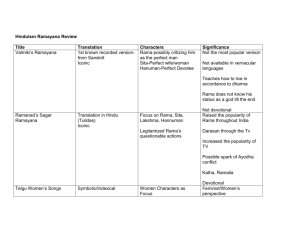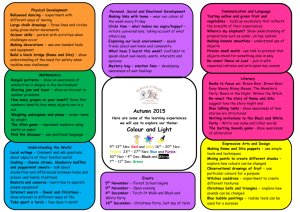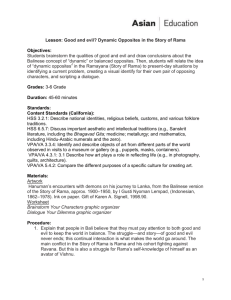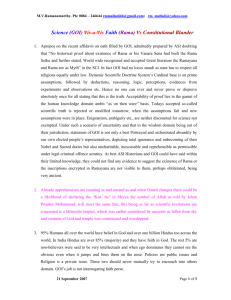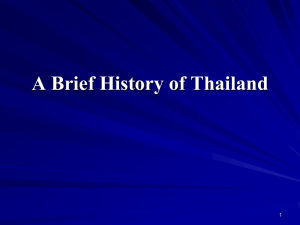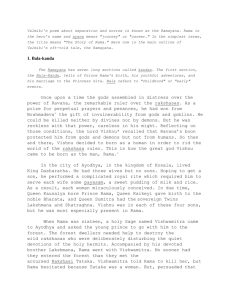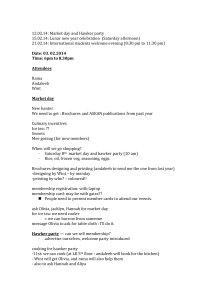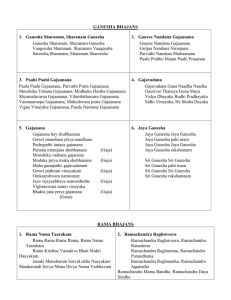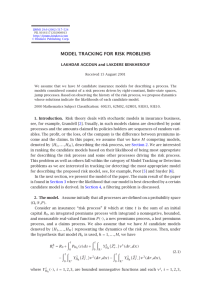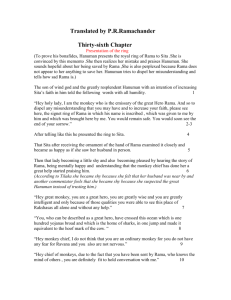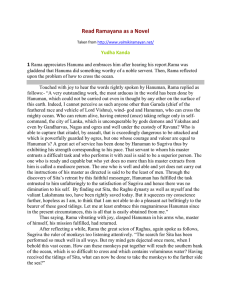rAma bANa
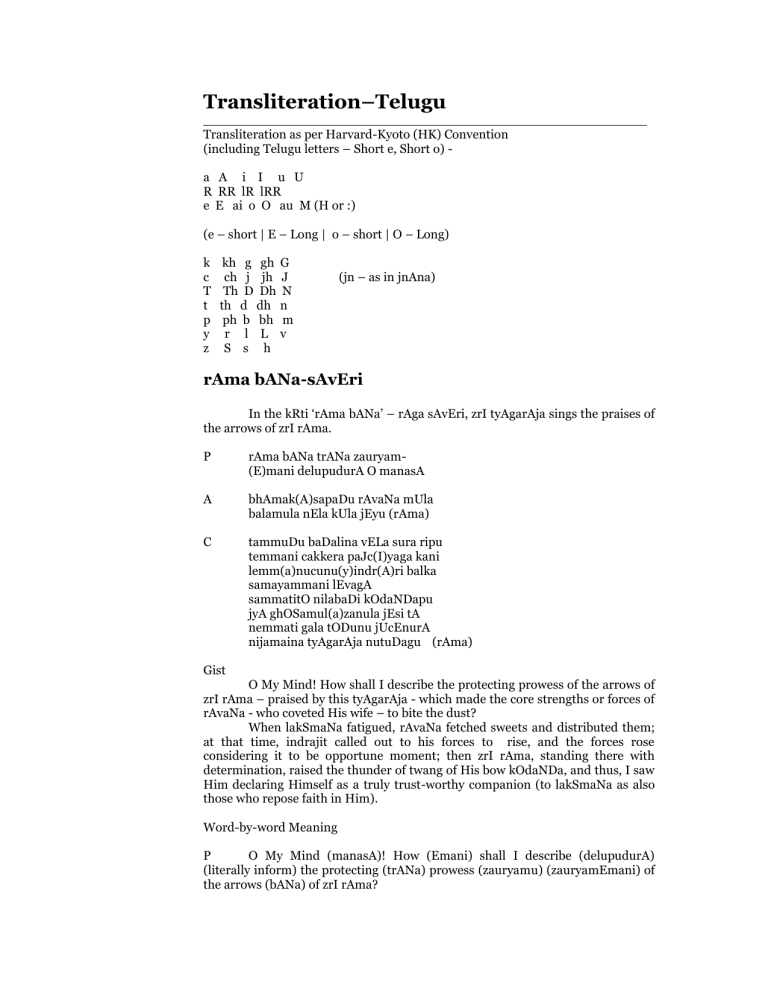
Transliteration–Telugu
_______________________________________________________
Transliteration as per Harvard-Kyoto (HK) Convention
(including Telugu letters – Short e, Short o) - a A i I u U
R RR lR lRR e E ai o O au M (H or :)
(e – short | E – Long | o – short | O – Long) k kh g gh G c ch j jh J (jn – as in jnAna)
T Th D Dh N t th d dh n p ph b bh m y r l L v z S s h rAma bANa-sAvEri
Gist
C
A
In the kRti ‘rAma bANa’ – rAga sAvEri, zrI tyAgarAja sings the praises of the arrows of zrI rAma.
P rAma bANa trANa zauryam-
(E)mani delupudurA O manasA bhAmak(A)sapaDu rAvaNa mUla balamula nEla kUla jEyu (rAma) tammuDu baDalina vELa sura ripu temmani cakkera paJc(I)yaga kani lemm(a)nucunu(y)indr(A)ri balka samayammani lEvagA sammatitO nilabaDi kOdaNDapu jyA ghOSamul(a)zanula jEsi tA nemmati gala tODunu jUcEnurA nijamaina tyAgarAja nutuDagu (rAma)
O My Mind! How shall I describe the protecting prowess of the arrows of zrI rAma – praised by this tyAgarAja - which made the core strengths or forces of rAvaNa - who coveted His wife – to bite the dust?
When lakSmaNa fatigued, rAvaNa fetched sweets and distributed them; at that time, indrajit called out to his forces to rise, and the forces rose considering it to be opportune moment; then zrI rAma, standing there with determination, raised the thunder of twang of His bow kOdaNDa, and thus, I saw
Him declaring Himself as a truly trust-worthy companion (to lakSmaNa as also those who repose faith in Him).
Word-by-word Meaning
P O My Mind (manasA)! How (Emani) shall I describe (delupudurA)
(literally inform) the protecting (trANa) prowess (zauryamu) (zauryamEmani) of the arrows (bANa) of zrI rAma?
A O My Mind! How shall I describe the protecting prowess of the arrows of zrI rAma which made (jEyu) the core (mUla) strengths or forces (balamula) of rAvaNa - who coveted (AsapaDu) His wife (bhAmaku) (bhAmakAsapaDu) – to bite (kUla) (literally knock down) the dust (nEla) (literally earth)?
C When (vELa) lakSmaNa - His Younger brother (tammuDu) fatigued
(baDalina), seeing (kani) rAvaNa – enemy (ripu) of celestials (sura) – fetching
(temmani) (literally call for) sweets (cakkera) (literally sugar) and distributing
(paJci Iyaga) (paJcIyaga) them, and then, indrajit – enemy (ari) of indra – called out (balka) (to his forces) to
(anucu) rise (lemmu) (literally get up) (lemmanucunu), and as the forces rose
(lEvagA) considering it to be (ani) opportune moment (samayammu)
(samayammani),
He (zrI rAma), standing there (nilabaDi) with determination
(sammatitO) raising (jEsi) (literally making) the thunder (azanula) of twang of
His bow (jyA ghOSamu) (jyAghOSamulazanula) kOdaNDa (kOdaNDapu), and thus,
I (tA) saw (jUcEnurA) Him (declaring) as (anu) a truly (nijamaina) trustworthy (nemmati gala) companion (tODu) (tODanu) (to lakSmaNa as also those who repose faith in Him);
How shall I describe the protecting prowess of the arrows of zrI rAma - the One praised (nutuDagu) by this tyAgarAja?
Notes –
P - delupudurA – this is how it is given in all books other than that of
TKG, wherein it is given as ‘pogaDudurA’. This needs to be checked. Any suggestions ???
C – cakkera paJcIyaga – in the vAlmIki rAmAyaNa, there is no such mention – this seems to be poetical imagination of the bard.
C – tODunu – this is how it is given in all the books other than that of
TKG, wherein it is given as ‘tODanu’. In the present context ‘tODunu’ seems to be appropriate. This needs to be checked. Any suggestions ???
C – nijamaina – This has been attached to the previous statement.
However, it can be attached to pallavi also.
Devanagari
{É. ®úÉ¨É ¤ÉÉhÉ jÉÉhÉ ¶ÉÉèªÉÇ-
(¨Éä)¨ÉÊxÉ näù™Öô{ÉÖnÖù®úÉ +Éä
¨ÉxɺÉÉ
+. ¦ÉɨÉ(EòÉ)ºÉ{ÉbÖ÷ ®úÉ´ÉhÉ ¨ÉÚ™ô
¤É™ô¨ÉÖ™ô xÉä™ô EÚò™ô VÉäªÉÖ
(®úÉ)
SÉ. iɨ¨ÉÖbÖ÷ ¤Éb÷Ê™ôxÉ ´Éä³ý ºÉÖ®ú
Ê®ú{ÉÖ
iÉ䨨ÉÊxÉ SÉDäò®ú {É(ˆÉÒ)ªÉMÉ EòÊxÉ
™äô(¨¨É)xÉÖSÉÖxÉÖ <(xpùÉ)Ê®ú ¤É±Eò
ºÉ¨ÉªÉ(¨¨É)ÊxÉ ™äô´ÉMÉÉ
ºÉ¨¨ÉÊiÉiÉÉä ÊxÉ™ô¤ÉÊb÷ EòÉänùhb÷{ÉÖ
VªÉÉ-PÉÉä¹É¨ÉÖ(™ô)¶ÉxÉÖ™ô VÉä漃 iÉÉ
xÉ䨨ÉÊiÉ MÉ™ô iÉÉäbÖ÷xÉÖ
VÉÚSÉäxÉÖ®úÉ
ÊxÉVɨÉèxÉ iªÉÉMÉ®úÉVÉ xÉÖiÉÖb÷MÉÖ (®úÉ)
English with Special Characters pa. r¡ma b¡¸a tr¡¸a ¿aurya-
(m®)mani delupudur¡ ° manas¡ a. bh¡ma(k¡)sapa·u r¡va¸a m£la
balamula n®la k£la j®yu (r¡) ca. tammu·u ba·alina v®½a sura ripu
temmani cakkera pa(µc¢)yaga kani
le(mma)nucunu i(ndr¡)ri balka
samaya(mma)ni l®vag¡
sammatit° nilaba·i k°da¸·apu
jy¡-gh°Àamu(la)¿anula j®si t¡
nemmati gala t°·unu j£c®nur¡
nijamaina ty¡gar¡ja nutu·agu (r¡)
Telugu xms. LSª«sV ËØßá ú»yßá afLRiùc
(®ªs[V)ª«sV¬s ®µ¶ÌÁVxmsoµR¶VLS J ª«sV©«sry
@. ˳ت«sV(NS)xqsxms²R¶V LSª«sßá ª«sVWÌÁ
ÊÁÌÁª«sVVÌÁ ®©s[ÌÁ NRPWÌÁ ÛÇÁ[¸R¶VV (LS)
¿RÁ. »R½ª«sVVø²R¶V ÊÁ²R¶ÖÁ©«s ®ªs[ÎÏÁ xqsVLRi Ljixmso
¾»½ª«sVø¬s ¿RÁZNPäLRi xms(ÄÔÁè)¸R¶VgRi NRP¬s
ÛÍÁ(ª«sVø)©«sV¿RÁV©«sV B(©ôyû)Lji ÊÁÌÁä
xqsª«sV¸R¶V(ª«sVø)¬s ÛÍÁ[ª«sgS
xqsª«sVø¼½»][ ¬sÌÁÊÁ²T¶ N][µR¶ßïáxmso
ÇØùc|mnsWxtsQª«sVV(ÌÁ)aRP©«sVÌÁ ÛÇÁ[zqs »y
®©sª«sVø¼½ gRiÌÁ »][²R¶V©«sV ÇÁÚ¿Á[©«sVLS
¬sÇÁ\®ªsV©«s »yùgRiLSÇÁ ©«sV»R½V²R¶gRiV (LS)
Tamil
T. WôU Tô 3 Q jWôQ ù^ü oVþ
(úU)U² ùR 3 Û×Õ 3 Wô K U]^ô
A. Tô 4 U(Lô)^TÓ 3 WôYQ êX
T 3 XØX úSX áX ú_Ù (WôU)
N. RmØÓ T 3 P 3 ] úY[ ^÷W ¬×
ùRm(U)² NdùLW Tg(º)VL 3 L²
ùXm(U)àÑà«kj 3 (Wô)¬ T 3 pL
^UVm(U)² úXYLô 3
^mU§úRô ¨XT 3 ¥ 3 úLôR 3 iP 3 ×
wVôþúLô 4 `Ø(X) ^ àX ú_³ Rô
ùSmU§ L 3 X úRôÓà _øúNàWô
¨_ûU] jVôL 3 Wô_ ÖÕP 3 Ï 3 (WôU)
CWôU TôQj§u LôdÏm §\j§û]
Gu]ùY]j ùR¬®lúT]Pô
,
J U]úU
!
(Ru) Uû]®ûV ®Úm×m CWôYQ²u êX
TXeL°û] Ui ùLüYf ùNnÙm
CWôU TôQj§u LôdÏm §\j§û]
Gu]ùY]j ùR¬®lúT]Pô
,
J U]úU
!
©uú]ôu Lû[jR úYû[
,
Yôú]ôo TûLYu
,
ùLôiÓYWf ùNôp
,
NdLûWûVl T¡okR°dLdLiÓ
,
×\lTùP] (R]Õ TûPLÞdÏ) Ck§W£jÕ TLW
,
(CÕRôu) NUVùU] (TûPLs) GZ
,
(CWôUu) EߧÙPu ¨uß
,
úLôRiPj§u
SôùQôûV C¥ùV] ùVÝl©
,
(U]) ¨mU§V°dÏm EiûUVô]j ÕûQ«û]
,
Sôu
LiúP]Pô
!
§VôLWôN]ôp úTôt\lùTtú\ô]ô¡V
CWôU²u TôQj§u LôdÏm §\j§û]
Gu]ùY]j ùR¬®lúT]Pô
,
J U]úU
!
©uú]ôu þ CXdÏYu
Yôú]ôo TûLYu þ CWôYQu
Kannada
®Ú. ÁÛÈÚß ·Ûy }ÛÃy ËèÁÚÀ-
(ÈæßÞ)ÈÚ߬ ¥æÄß®Úâ´¥ÚßÁÛ K ÈÚß«ÚÑÛ
@. ºÛÈÚß(OÛ)ÑÚ®ÚsÚß ÁÛÈÚy ÈÚßàÄ
¶ÄÈÚßßÄ «æÞÄ OÚàÄ eæÞ¾Úßß (ÁÛ)
^Ú. }ÚÈÚßß½sÚß ¶sÚÆ«Ú ÈæÞ×Ú ÑÚßÁÚ Â®Úâ´
}æÈÚß½¬ ^ÚOæQÁÚ ®Ú(jÝ`Þ)¾ÚßVÚ OÚ¬
Åæ(ÈÚß½)«Úß^Úß«Úß B(«Û§ð) ¶ÄQ
ÑÚÈÚß¾Úß(ÈÚß½)¬ ÅæÞÈÚVÛ
ÑÚÈÚß½~}æàÞ ¬Ä¶t OæàÞ¥Úyu®Úâ´
eÛÀ-YæàÞÎÚÈÚßß(Ä)ËÚ«ÚßÄ eæÞÒ }Û
«æÈÚß½~ VÚÄ }æàÞsÚß«Úß dà^æÞ«ÚßÁÛ
¬dÈæßç«Ú }ÛÀVÚÁÛd «Úß}ÚßsÚVÚß (ÁÛ)
Malayalam
]. cma _mW {XmW iucyþ
(ta)a\n sZep]pZpcm Hm a\km
A. `ma(Im)k]Up cmhW aqe
_eape t\e Iqe tPbp (cm)
N. X½pUp _Uen\ thf kpc cn]p
sX½\n Ns¡c ](©o)bK I\n
se(½)\pNp\p C({µm)cn _evI
kab(½)\n tehKm
k½XntXm \ne_Un tImZWvU]p
PymþtLmjap(e)i\pe tPkn Xm
s\½Xn Ke tXmUp\p PqtN\pcm
\nPssa\ XymKcmP \pXpUKp (cm)
Assamese
Y. »ç] [ýçS yçS å`ìÌ^ï-
(å])]×X åV_ÇYÇVÇ»ç C ]Xaç
%. \öç](Eõç)aYQÇö »ç¾S ]É_
[ý_]Ç_ åX_ EÉõ_ åLÌ^Ç (»ç)
$Jô. Tö¶ö‚ÇQÇö [ýQö×_X å¾_ aÇ» ×»YÇ
åTö¶ö‚×X $Jôãhõ» Y(‡ûÝ)Ì^G Eõ×X
å_(¶ö‚)XÇÅ$JÇôXÇ +(³VÐç)×» [ý’õ
a]Ì^(¶ö‚)×X å_¾Gç
a¶ö‚×TöãTöç ×X_[ý×Qö åEõçV‰øYÇ
LËÌ^ç-åHçb]Ç(_)`XÇ_ åL×a Töç
åX¶ö‚×Tö G_ åTöçQÇöXÇ LÉä$JôXÇ»ç
×XLê]X ±Ì^çG»çL XÇTÇöQöm (»ç)
Bengali
Y. Ì[ýç] [ýçS yçS å`ìÌ^ï-
(å])]×X åV_ÇYÇVÇÌ[ýç C ]Xaç
%. \öç](Eõç)aYQÇö Ì[ýç[ýS ]É_
[ý_]Ç_ åX_ EÉõ_ åLÌ^Ç (Ì[ýç)
»Jô. Tö¶ö‚ÇQÇö [ýQö×_X å[ý_ aÇÌ[ý ×Ì[ýYÇ
åTö¶ö‚×X »JôãhõÌ[ý Y(‡ûÝ)Ì^G Eõ×X
å_(¶ö‚)XÇÅ»JÇôXÇ +(³VÐç)×Ì[ý [ý’õ
a]Ì^(¶ö‚)×X å_[ýGç
a¶ö‚×TöãTöç ×X_[ý×Qö åEõçV‰øYÇ
LËÌ^ç-åHçb]Ç(_)`XÇ_ åL×a Töç
åX¶ö‚×Tö G_ åTöçQÇöXÇ LÉä»JôXÇÌ[ýç
×XLê]X ±Ì^çGÌ[ýçL XÇTÇöQöm (Ì[ýç)
Gujarati
~É. ÷É©É ¥ÉÉiÉ mÉÉiÉ ¶ÉÉä«ÉÇ-
(©Éà)©ÉÊ{É qèö±ÉÖ~ÉÖqÖö÷É +Éà ©É{É»ÉÉ
+. §ÉÉ©É(HíÉ)»É~ÉeÖô ÷É´ÉiÉ ©ÉÚ±É
¥É±É©ÉÖ±É {Éà±É HÚí±É Wðà«ÉÖ (÷É)
SÉ. lÉ©©ÉÖeÖô ¥ÉeôʱÉ{É ´Éà³ »ÉÖ÷ Ê÷~ÉÖ
lÉè©©ÉÊ{É SÉIèí÷ ~É(_SÉÒ)«ÉNÉ HíÊ{É
±Éè(©©É){ÉÖSÉÖ{ÉÖ <({röÉ)Ê÷ ¥É±Hí
»É©É«É(©©É)Ê{É ±Éà´ÉNÉÉ
»É©©ÉÊlÉlÉÉà Ê{ɱɥÉÊeô HíÉàqöieô~ÉÖ
V«ÉÉ-PÉÉàºÉ©ÉÖ(±É)¶É{ÉÖ±É WðàÊ»É lÉÉ
{Éè©©ÉÊlÉ NÉ±É lÉÉàeÖô{ÉÖ WÚðSÉà{ÉÖ÷É
Ê{ÉWð©Éä{É l«ÉÉNÉ÷ÉWð {ÉÖlÉÖeôNÉÖ (÷É)
Oriya
`. eþÐc aÐZ [öÐZ ÒhׯàÆ-
(Òc)c_Þ Ò]mÊþ`Ê]ÊeþÐ J c_jÐ
@. bþÐc(LÐ)j`XÊ eþÐgZ cËmþ
amþcÊmþ Ò_mþ LËmþ ÒS¯ÊÆ (eþÐ)
Q. [®Ê¤XÊ aXmÞþ_ Ògf jÊeþ eÞþ`Ê
Ò[®¤_Þ QÒ£Æeþ `(qÑ)¯ÆN L_Þ
Òmþ(®¤)_ÊQÊ_Ê B(tõÐ)eÞþ amçþL
jc¯Æ(®¤)_Þ ÒmþgNÐ
j®¤[ÞÒ[Ð _ÞmþaXÞ ÒLÐ]¨Æ`Ê
SÔÐ-ÒOÐicÊ(mþ)h_Êmþ ÒSjÞ [Ð
Ò_®¤[Þ Nmþ Ò[ÐXÊ_Ê SËÒQ_ÊeþÐ
_ÞSÒcß_ [ÔÐNeþÐS _Ê[ÊXNÊ (eþÐ)
Punjabi a. jsg dsX ZsX o¬ji-
(g~)gu` ]~kxax]xjs D g`ns
A. esg(Es)naUx jsmX gyk
dkgxk `¡k Eyk O~hx (js)
M. Y°gxUx dUuk` m~k nxj ujax
Y~°gu` M°E~j a(RMv)hI Eu`
k~(gg)`xMx`x uB(`^s)uj dkE
ngh(gg)u` k~mIs
n°guYY¨ u`kduU E¨]XUax
Ois-K¨ogx(k)o`xk O~un Ys
`~±guY Ik Y¨Ux`x OyM~`xjs
u`Og¤` YisIjsO `xYxUIx (js)

